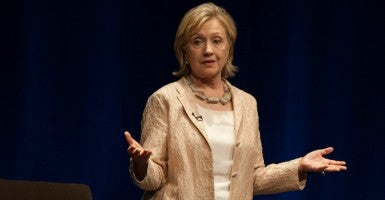Those 300 Hillary Clinton emails released by the State Department to the House Select Committee on Benghazi appear to confirm the view that Clinton’s top concern was protecting the State Department and her own reputation as Congress began its investigations in the aftermath of the attack.
As reported by The New York Times, based on a source who has seen the unpublished Clinton emails, Clinton wrote to a “State Department official” after the official had received tough questioning by a congressional panel a month after the Benghazi attack. “Did we survive? Clinton asked. “Survive, yes,” the official answered.
On Oct. 10, 2012, almost exactly a month after the attack, Under Secretary of State for Management Patrick Kennedy testified in the first Benghazi hearing of the House Government Oversight and Reform Committee, where he was grilled about the lack of security at the Benghazi compound.
Clinton’s concern over State’s image fits with what has been revealed about the efforts to protect Clinton and the State Department by Clinton’s spokeswoman at the time, Victoria Nuland (since promoted to assistant secretary of state for European Affairs). In the days after the Sept. 11, 2012, attack, Nuland took an active role in shaping the Obama administration’s misleading talking points about what happened in Benghazi and why.
Nuland told the National Security Council staff that her “building leadership” took issue with the talking points written up by the CIA. The initial talking points included a paragraph on the well-known risks to U.S. diplomats of terrorist activity in Benghazi. The offending paragraph was duly removed.
The emails also cover the performance of U.N. Ambassador Susan Rice on the Sunday talk shows after the attack. Rice provoked a firestorm of criticism by declaring categorically—but without evidence—that the attack grew spontaneously out of a demonstration over an anti-Islamic YouTube video and showed no evidence of premeditation.
In light of the criticism directed at Rice, Clinton emails an aide to ask her to review her own statements on Benghazi to make sure she had not exposed herself in the same way. Clinton was told she had not, even though statements by both Clinton and President Obama pointed strongly to the video as the cause. Both the Departments of State and Defense, it should be added, immediately concluded terrorism was involved.
What else there might have been in Clinton’s emails remains to be seen. The clock is ticking. Benghazi Select Committee Chairman Trey Gowdy, R-S.C., has given Clinton a deadline of this Friday to turn over the email server that was located in her home in Chappaqua, N.Y., when she was serving as secretary of state. In light of Clinton’s penchant for secrecy, this seems an eminently reasonable request.
































